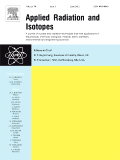
Applied Radiation and Isotopes
Scope & Guideline
Innovating Applications of Radiation Science
Introduction
Aims and Scopes
- Radiation Dosimetry and Measurement Techniques:
Research in this area includes the development and validation of dosimetry methods, including thermoluminescence dosimetry, optically stimulated luminescence, and advanced detection systems for radiation measurement. - Radiopharmaceutical Development and Applications:
This scope encompasses the synthesis, characterization, and clinical applications of radiopharmaceuticals for diagnostic and therapeutic purposes, including PET imaging and targeted radionuclide therapy. - Nuclear and Radiation Safety:
Studies focusing on the evaluation and optimization of radiation safety protocols, including assessments of exposure levels, risk analysis, and the development of shielding materials. - Neutron Activation Analysis and Isotope Production:
Research related to neutron activation techniques for elemental analysis and the production of medical isotopes, emphasizing the optimization of reaction conditions and cross-section measurements. - Environmental and Health Physics:
Investigations concerning the impact of natural and anthropogenic radiation on health and the environment, including studies on radon levels, radioactive waste management, and the radiological assessment of materials. - Monte Carlo Simulations and Computational Methods:
Utilization of Monte Carlo simulations for modeling radiation interactions, dose calculations, and experimental setups to enhance the understanding of radiation effects in various applications.
Trending and Emerging
- Innovative Radiopharmaceuticals and Targeted Therapy:
There is a growing focus on the development of new radiopharmaceutical agents, particularly those that utilize novel targeting mechanisms for cancer treatment. This trend is driven by advances in personalized medicine and the need for more effective therapeutic options. - Machine Learning and Artificial Intelligence in Radiological Applications:
The integration of machine learning algorithms in analyzing radiation data, optimizing treatment plans, and enhancing imaging techniques is becoming increasingly prevalent, highlighting the potential for computational methods in improving clinical outcomes. - Advanced Dosimetry Techniques:
Emerging methods in dosimetry, including real-time monitoring systems and the use of novel materials for dosimetry applications, indicate a trend towards improving the accuracy and efficiency of dose measurement in clinical settings. - Sustainable Practices in Radiation Applications:
Research focusing on the environmental impact of radiation applications and the development of sustainable practices is gaining traction, reflecting a broader societal emphasis on environmental stewardship. - Neutron and Gamma-ray Imaging Techniques:
The development of advanced imaging techniques utilizing neutrons and gamma rays for non-destructive testing and evaluation in various fields, including materials science and medical diagnostics, is on the rise. - Health Physics in Radiotherapy and Diagnostic Imaging:
The application of health physics principles in optimizing radiotherapy and diagnostic imaging protocols is increasingly emphasized, underscoring the importance of safety and efficacy in patient care.
Declining or Waning
- Traditional Radiation Detection Methods:
While foundational, traditional methods of radiation detection are being overshadowed by newer technologies and methodologies that offer improved sensitivity and specificity, leading to a decline in publications focused solely on these older techniques. - Basic Nuclear Physics Research:
There has been a noticeable decrease in papers focused on fundamental nuclear physics research, as the journal shifts towards applications of radiation in clinical and industrial settings rather than theoretical explorations. - General Health Physics:
Health physics topics that do not incorporate modern diagnostic or therapeutic applications are becoming less common, as the journal emphasizes applied research that directly impacts clinical practices and patient care. - Stand-alone Environmental Studies:
Environmental studies that do not integrate radiation applications or health impacts are less frequently published, as the journal increasingly favors research that ties environmental measurements to broader implications in health physics or safety.
Similar Journals

Radiological Physics and Technology
Bridging disciplines for a healthier tomorrow.Radiological Physics and Technology, published by SPRINGER JAPAN KK, is a prominent journal that serves as a crucial resource in the multidisciplinary fields of medicine and radiation sciences. With an ISSN of 1865-0333 and an E-ISSN of 1865-0341, the journal has been converging impactful research from 2008 to 2024. It holds a commendable position in academic rankings, currently classified in Q2 in Physical Therapy, Sports Therapy and Rehabilitation and Radiation, along with Q3 for Medicine (miscellaneous) and Radiology, Nuclear Medicine and Imaging. The journal is well-regarded in the academic community, reflected in its Scopus rankings that place it in the upper tiers of its respective categories. Although it currently does not offer Open Access, Radiological Physics and Technology remains a pivotal publication for researchers, academics, and practitioners seeking to advance knowledge and foster innovation in radiological science. Its commitment to disseminating high-quality research ensures its continued relevance and importance within these fields.
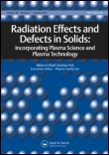
Radiation Effects and Defects in Solids
Innovating Solutions for Nuclear Energy and BeyondRadiation Effects and Defects in Solids is a prestigious academic journal published by TAYLOR & FRANCIS LTD that has been at the forefront of research related to the impacts of radiation on various solid materials since its inception in 1989. With an ISSN of 1042-0150 and an E-ISSN of 1029-4953, this journal serves as an essential resource for researchers and professionals in the fields of Condensed Matter Physics, Materials Science, and Nuclear and High Energy Physics. Despite its current categorization in the Q4 quartile across these disciplines, Radiation Effects and Defects in Solids remains critical for advancing knowledge of material responses to radiation, which is vital for applications in nuclear energy, space exploration, and radiation therapy. The journal publishes original research articles, reviews, and letters that provide insights into material properties, radiation dosimetry, and defect structures, fostering collaboration and innovation within the scientific community. As the field evolves, Radiation Effects and Defects in Solids continues to play a significant role in disseminating valuable research findings and keeping pace with emerging trends in materials science and radiation physics.
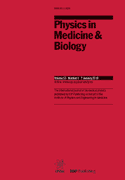
PHYSICS IN MEDICINE AND BIOLOGY
Merging Physics with Medicine for a Healthier FuturePHYSICS IN MEDICINE AND BIOLOGY is a prestigious journal published by IOP Publishing Ltd, with a storied history dating back to 1956 and extending through 2024. This internationally recognized journal caters to the interdisciplinary fields of medical physics and bioengineering, making significant contributions to the research and development of advanced diagnostic and therapeutic technologies. It holds an impressive Q1 ranking in both Radiological and Ultrasound Technology and Radiology, Nuclear Medicine and Imaging categories, reflecting its critical role in disseminating high-quality research. With a significant focus on merging the principles of physics with advancements in medicine, PHYSICS IN MEDICINE AND BIOLOGY serves as an essential resource for researchers, professionals, and students alike, fostering innovation and enhancing collaboration in the healthcare sector. Although the journal is not currently open access, it maintains robust participation in the Scopus database, ranking #62 out of 333 in Radiology, Nuclear Medicine and Imaging and #17 out of 63 in Radiological and Ultrasound Technology, signifying its influence and reach within these disciplines.
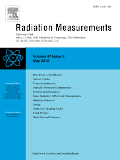
RADIATION MEASUREMENTS
Exploring the Dynamics of Radiation Technology.RADIATION MEASUREMENTS is a highly regarded academic journal published by Pergamon-Elsevier Science Ltd, focusing on the interdisciplinary field of radiation science and instrumentation. With an ISSN of 1350-4487 and an E-ISSN of 1879-0925, this journal aims to disseminate cutting-edge research and practical advancements from 1994 to 2024. It holds a commendable position in the Scopus rankings, being categorized in the top quartiles (Q2) for both Instrumentation and Radiation, reflecting its significance in the scientific community with a notable percentile of 64th and 59th, respectively. Although it does not offer Open Access options, the journal serves as a vital resource for researchers, professionals, and students seeking to explore innovations that shape the understanding and measurement of radiation phenomena. With a commitment to high-quality research, RADIATION MEASUREMENTS continues to contribute essential knowledge in the fields of physics and astronomy, positioning itself as a key publication for those dedicated to advancing radiation technology and its applications.
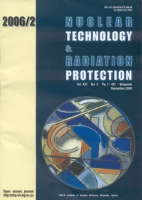
Nuclear Technology & Radiation Protection
Pioneering research for a safer nuclear future.Nuclear Technology & Radiation Protection is a distinguished open-access journal published by the VINCA Institute of Nuclear Sciences, Serbia, dedicated to advancing knowledge in the fields of nuclear energy and radiation safety. Since its inception in 2002, the journal has been an essential resource for researchers, professionals, and students, offering a platform for the dissemination of high-quality research that contributes to the safe and efficient use of nuclear technology. With an impressive Q2 ranking in both the Nuclear Energy and Engineering and Safety, Risk, Reliability and Quality categories for 2023, the journal reflects a commitment to excellence and relevance within its scope. It serves as a pivotal forum for sharing innovative findings, addressing current challenges, and contributing to the global discourse on nuclear safety and technology. The journal is indexed in Scopus, enhancing its visibility and impact in the academic community. By facilitating unrestricted access to its articles, Nuclear Technology & Radiation Protection continues to foster collaboration and engagement among scholars in the nuclear science domain.

Radiation Detection Technology and Methods
Pioneering Research for Enhanced Energy SecurityRadiation Detection Technology and Methods is a prominent academic journal published by Springer Singapore Pte Ltd, dedicated to advancing the field of nuclear and high-energy physics, as well as nuclear energy and engineering. Established in 2017, this journal provides a platform for the dissemination of pioneering research and innovative methodologies in radiation detection technology. As of 2023, it holds a commendable Q2 ranking in both the categories of Nuclear and High Energy Physics and Nuclear Energy and Engineering, underscoring its significance in fostering scholarly discourse within these vital fields. With ISSN 2509-9930 and E-ISSN 2509-9949, the journal aims to cater to a diverse audience of researchers, professionals, and students, emphasizing open access to knowledge. The journal's contributions are particularly crucial for those engaged in the development of safer and more efficient radiation detection techniques, ultimately bridging the gap between theory and practical applications in energy security and health physics. For researchers seeking a dedicated outlet for their work, Radiation Detection Technology and Methods represents an invaluable resource and an opportunity to influence the future of radiation science.
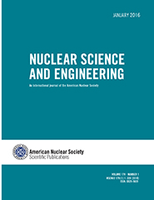
NUCLEAR SCIENCE AND ENGINEERING
Empowering Research in Nuclear Energy and EngineeringNUCLEAR SCIENCE AND ENGINEERING, published by Taylor & Francis Inc, is a leading journal in the field of nuclear energy and engineering, providing a vital platform for disseminating cutting-edge research and advancements from both academia and industry. With an ISSN of 0029-5639 and an E-ISSN of 1943-748X, the journal boasts a notable impact factor and is categorized in the Q2 quartile for 2023, reflecting its influence and quality in the field. Covering a comprehensive scope from the inception of nuclear technology in 1969 to contemporary advancements forecasted for 2024, it ranks #38 out of 77 in the Scopus Energy – Nuclear Energy and Engineering category, placing it in the 51st percentile. Although the journal is not open access, it remains essential for researchers, professionals, and students seeking to stay abreast of the latest developments and innovations in nuclear science. Located in the heart of Philadelphia, NUCLEAR SCIENCE AND ENGINEERING contributes significantly to the advancement of nuclear engineering knowledge and practice, making it a crucial resource for anyone involved in this dynamic field.
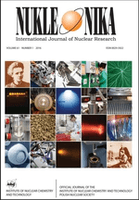
NUKLEONIKA
Pioneering Research in Nuclear and Condensed Matter PhysicsNUKLEONIKA, published by SCIENDO, is a leading open access journal that has been serving the scientific community since its establishment in 1968. Focused on the domains of Nuclear and High Energy Physics, Condensed Matter Physics, and Nuclear Energy and Engineering, this journal provides a platform for innovative research and technological advancements in a variety of interdisciplinary fields. With an impressive history of publications and a current Q3 ranking in several categories, including Safety, Risk, Reliability and Quality and Waste Management and Disposal, NUKLEONIKA is recognized for its significant contributions to scientific discourse. Open access since 2014, the journal ensures that all research outputs are freely available, facilitating broad dissemination and accessibility for researchers, professionals, and students alike. Located in the heart of Warsaw, Poland, NUKLEONIKA aims to inspire collaborative efforts and foster a deeper understanding of complex physical phenomena and their practical implications.
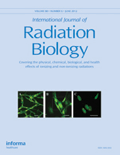
INTERNATIONAL JOURNAL OF RADIATION BIOLOGY
Connecting Scholars in Radiation BiologyINTERNATIONAL JOURNAL OF RADIATION BIOLOGY, published by Taylor & Francis Ltd, has established itself as a premier forum for the dissemination of innovative research related to radiation biology, covering emerging topics that are crucial within the fields of radiology, nuclear medicine, and ultrasound technology. With an ISSN of 0955-3002 and an E-ISSN of 1362-3095, this journal spans over six decades, from its inception in 1959 to 2024, reflecting a rich history of scholarly contribution and a dynamic approach to addressing current challenges in the discipline. Its reputation is highlighted by its Q2 rankings in both Radiology, Nuclear Medicine and Imaging and Radiological and Ultrasound Technology for 2023, underscoring its relevance in a competitive academic landscape, with Scopus rankings placing it in the top tier of its category. While operating under a traditional access model, the journal aims to connect researchers, professionals, and students, facilitating the advancement of knowledge and fostering a deeper understanding of the impact of radiation in various medical applications. The journal plays an essential role in shaping future research directions and enhancing clinical practices globally.
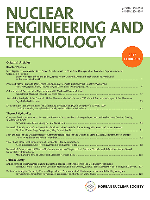
Nuclear Engineering and Technology
Leading the Charge in Nuclear Engineering ExcellenceNuclear Engineering and Technology, published by the Korean Nuclear Society, is a premier Open Access journal dedicated to the rapidly evolving fields of nuclear energy and engineering. Established as a significant platform for scholarly communication since 2008, this journal has consistently anchored itself in the academic community, achieving a Q2 ranking in its category as of 2023, reflecting its influence and quality within the domain of Nuclear Energy and Engineering. With an impressive Scopus ranking of #15 out of 77, positioning it in the 81st percentile, the journal publishes cutting-edge research that addresses both fundamental and applied aspects of nuclear technology. Nuclear Engineering and Technology embraces an open access model since 2013, ensuring that valuable research is accessible to a global audience, thereby enhancing collaboration among researchers, professionals, and students passionate about advancing nuclear technology. The journal serves as an essential resource for those aiming to innovate and push the boundaries of knowledge in nuclear sciences.